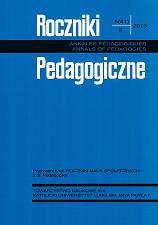Wcześniactwo a trudne rodzicielstwo w okresie pre- i perinatalnym
Prematurity and Difficult Parenting in the Pre- and Perinatal Period
Author(s): Ilona Bidzan, Mariola Bidzan , Łucja BieleninikSubject(s): Cultural Essay, Political Essay, Societal Essay
Published by: Towarzystwo Naukowe KUL & Katolicki Uniwersytet Lubelski Jana Pawła II
Keywords: Prematurity; parent-child relations; stress; psychological; perception; cerebral palsy
Summary/Abstract: Functioning of a family, in terms of premature birth and potential developmental disorders related to prematurity, disease and/or disability of a child, is conditioned by a configuration of the following factors: premature birth, giving birth to a premature baby (especially with extremely low birth weight), the onset of a disease, its course, the child’s disability resulting from the disease and family resources. Difficult parenting, which is the subject of the following analysis, can begin already during the pregnancy, from the moment parents hear the diagnosis that the pregnancy belongs to the high perinatal risk group. Currently one of the most frequent reasons of qualifying pregnancy to the risk group is the threat of premature birth. Therefore the article is focused on difficult parenting resulting from the sole fact of prematurity (e.g. long-term health problems, for example respiratory, sensory, motor disorders), and premature birth (considered in terms of a distressing and traumatic event). The article was illustrated with casuistic cases, referring to: 1. the difficulty of being a parent of a child born prematurely with cerebral palsy, 2. the inaccurate (detrimental) perception of a prematurely born child by its mother in the period of early childhood. The article presents phases of adaptation to the chronic disease, both of the child and of its parents. The significant role of the parents’ adaptive abilities was emphasized. Depending on the way the parents perceive the situation (as harm, threat or challenge), they are featured by different emotions, parental attitudes, perception of prematurity and illness, and the quality of life.
Journal: Roczniki Pedagogiczne
- Issue Year: 5/2013
- Issue No: 3
- Page Range: 39-70
- Page Count: 32
- Language: Polish

